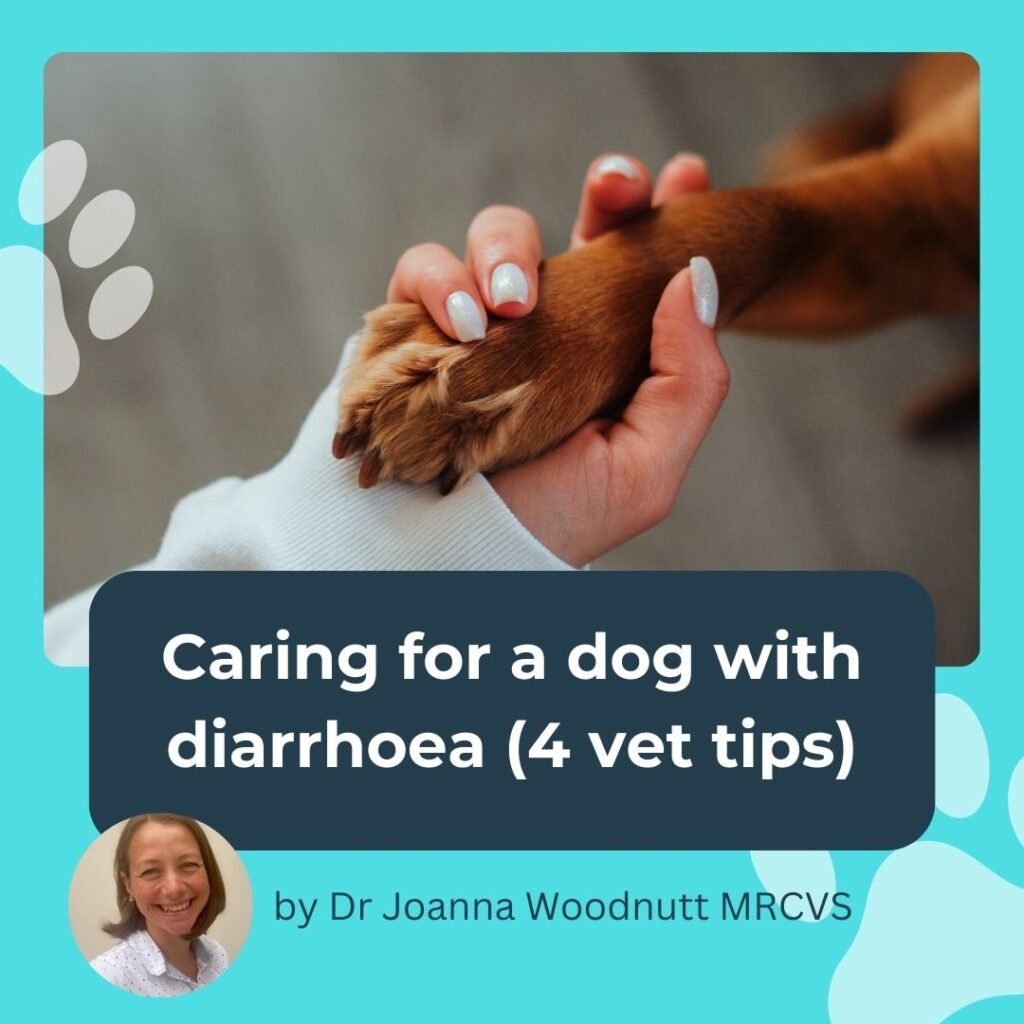Diarrhoea is one of the most common reasons pet parents visit the vet, with around 1 in 15 dogs experiencing it every year. From eating something they shouldn’t have to more serious illnesses, there are many reasons why your dog might have an upset tummy. While it’s unpleasant for your furry friend (and for you), the good news is that most cases resolve quickly with a little TLC at home.
Since I graduated from veterinary school in 2016 I’ve seen hundreds of dogs with diarrhoea. Often, pet parents just need a little support to know what’s best to do at home. So, here’s how to care for a dog with diarrhoea, when to seek vet help, and five trusted tips to help your dog recover.
What causes diarrhoea in dogs?
Dogs can get diarrhoea from scavenging food on walks, sudden changes in diet, food intolerances, or infections picked up at the park or kennels. Parasites, like worms, can also cause diarrhoea, especially in young puppies or dogs that aren’t regularly wormed.
Stress and underlying health conditions such as pancreatitis, liver disease, or inflammatory bowel disease can also trigger diarrhoea, particularly in dogs with recurring tummy troubles.
When should you take your dog to the vet for diarrhoea?
While mild diarrhoea often clears up at home, some symptoms mean you’ll need to see your vet:
- Bloody diarrhoea or black, tarry stools
- Diarrhoea lasting more than 3 days
- Vomiting that continues for more than 12 hours
- Puppies, elderly dogs, or those with other health conditions with diarrhoea
- Lethargy or a noticeable drop in energy
- Dogs not up to date with vaccinations, especially for parvovirus
If your dog shows any of these signs, get them checked by your vet as soon as possible, as these are signs that the diarrhoea may be caused by something more serious.
5 vet tips for caring for a dog with diarrhoea at home
1. Let your dog rest and recover
Just like us when we’re unwell, dogs need plenty of rest when they have diarrhoea. Skip the long walks and let your pup relax at home. Short trips outside for toilet breaks are enough – and remember, diarrhoea often means more frequent toilet needs, so be patient and give them extra opportunities to go.
2. Don’t feed chicken and rice
It’s tempting to try ‘bland’ foods like chicken and rice, but these diets are incomplete, potentially worsening stomach troubles. In fact, sudden diet changes can often make diarrhoea worse. Instead, add fibre to your dog’s normal diet or switch to a vet-recommended sensitive digestion food designed for tummy troubles.
Personally, I really like the Hills Canine Gastrointestinal Biome food. It has so much great science behind it, and the high fibre content has been proven to be excellent at relieving diarrhoea while protecting the microbiome.

Hills Canine Gastrointestinal Biome
If your dog is prone to diarrhoea, having a few cans of this to hand is worthwhile!
3. Encourage them to drink more water
Diarrhoea causes dehydration, so make sure your dog’s water bowl is always full. If they’re reluctant to drink, try adding a little tuna water or cooled chicken broth to make the water more appealing. Note – don’t add stock cubes or commercial chicken broth that has had salt added. Another option is to get a pet-specific oral rehydration solution like Oralade. It’s the pet equivalent of a sports drink, with all the electrolytes they need.
4. Add probiotics and prebiotics for gut health
Probiotics and prebiotics help restore your dog’s gut bacteria, speeding up recovery from diarrhoea. Dogs with diarrhoea often have a messed up microbiome, but more and more evidence is suggesting that looking after their gut is essential. However, don’t reach for the yoghurt – it’s far better to opt for a canine-specific probiotic product. I like YuDigest Plus for sudden tummy troubles, as it also contains clay to physically firm the poop and make it easier to pass. For dogs prone to stomach upset who need more gut support, I like PetLab Co’s chews.
Find out more about the dog gut microbiome.
Can’t my vet prescribe something for dog diarrhoea?
While there are prescription medicines that can help some cases of diarrhoea, they’re not needed for most of the causes. Even the antibiotic metronidazole (brand names Eradia, Metrobactin, Metrocare, Metrotab Vet, and Metrovis) has fallen out of favour, after studies showed it was no better than added fibre for controlling diarrhoea, and it messed with the gut microbiome for weeks or months after use. That said, if your dog is struggling, your vet should be able to prescribe something to help them.
Caring for a dog with diarrhoea: final thoughts
With the right care, most dogs with diarrhoea get better quickly, either at home or with a little help from your vet. Keep a close eye on your dog, make sure they stay hydrated, and don’t hesitate to call your vet if symptoms worsen or don’t improve within a couple of days. With your TLC and these vet-approved tips, your dog will be back to their happy, tail-wagging self in no time.
- Why Do Dogs Sleep So Much? A Vet Explains What’s Normal (and What’s Not) - March 27, 2025
- 10 Signs Your Dog Needs Probiotics – Vet Explains When to Supplement - March 14, 2025
- The dog gut microbiome explained (by a vet) - March 10, 2025




